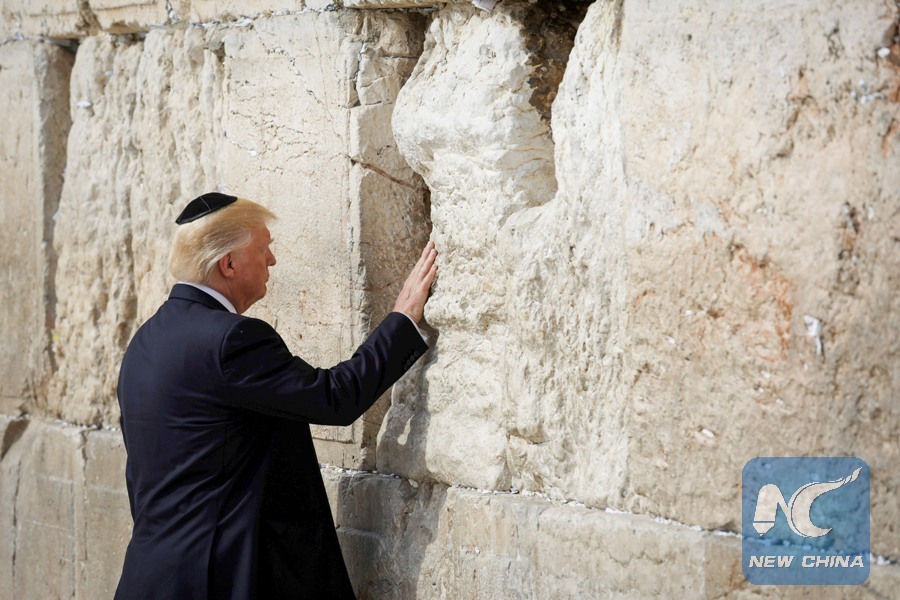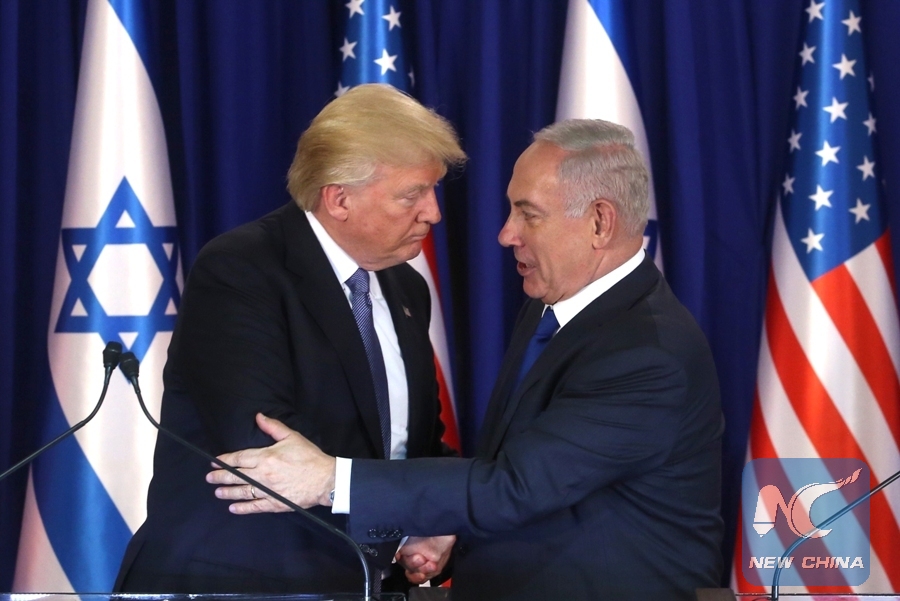
U.S. President Donald Trump visits the Western Wall in Jerusalem, May 22, 2017. (Xinhua/Nati Shochat-JINI)
WASHINGTON, May 24 (Xinhua) -- As U.S. President Donald Trump wrapped up his maiden trip to the Middle East, his intention to reset strained relationship between the U.S. and the Muslim world was vividly revealed.
According to historical data by the White House, eight among the last 10 U.S. presidents chose either Canada or Mexico, both neighbouring and traditionally friendly countries, as their first stop of maiden trips overseas.
Analysts said the fact that Trump chose Saudi Arabia as his first stop overseas indicated his realization that a more constructive relationship with the Muslim world is crucial for the success of his counterterrorism campaign, deemed by the White House in early days as a key pillar of the Trump administration's foreign policy.
During his two-day stay in Saudi Arabia, Trump not only met with leaders of the Muslim world, but also delivered a centerpiece speech to introduce his vision for the Middle East moving forward.
In a major deviation from his campaign rhetoric of regarding Islam as a religion of hatred, Trump significantly softened his tone on Islam and the Muslim world in the speech in a bid to portray himself as a partner of the Muslim world rather than an enemy.
During his speech, Trump framed the war against terrorism as not "a battle between different faiths, different sects or different civilizations," a measured assessment unlike his incendiary language on the campaign trail when he once pointedly claimed that "Islam hates us."
He also called for "partnership based on shared interests and values" between the United States and the Muslim world, mentioning little of his campaign pledges to monitor mosques back home and to establish a database of domestic Muslims, two controversial proposals he had yet to disavow publicly.
Also, while in the past he repeatedly blast his predecessor Barack Obama for not using the term "radical Islamic terrorism" in fear of tarnishing the whole religion, Trump steered clearly of the phrase before his Muslim audience.
In an interview with CNN, former U.S. State Department spokesman Jen Psaki downplayed the possibility that Trump's measured tone could indicate a policy shift.
"I think what everybody will be closely watching in the Muslim world is what actions he takes. Does his administration keep pursuing the travel ban? Does he change the rhetoric at home? What does he say when he does a rally in Ohio in two weeks?" Psaki said.
Meanwhile, Trump's Middle East trip showed his intention to reset Obama administration's Middle East policy by beefing up support to Saudi Arabia and Israel, regional nemesis of Iran.
Under the Obama administration, much to Sunni-led Saudi Arabia and Israel's dismay, the United States and Shiite-led Iran held the first direct talks since the 1979 Iran Islamic Revolution to negotiate a deal over the Iran nuclear issue.
As a result of deal, a large proportion of U.S. sanctions against Iran were lifted, delivering a major blow to Iran's sectarian rivals in the Sunni camp and Israel.
To add insult to injury, from the Arab world's perspective, the Obama administration was seeking to establish a carefully constructed power balance in the Middle East as an external balancer at the cost of traditional U.S. military support to Saudi Arabia.
In an exclusive interview with the Atlantic in March, 2016, Obama called on Saudis to "share the neighborhood" with their Iranian foes and "institute some sort of cold peace."
In an apparent effort to change the regional policy of Obama, Trump used his first foreign trip to reclaim U.S. firm support for Sunni Arab states led by Saudi Arabia and called for isolation of Iran.
Calling Iran a regional player that "has fueled the fires of sectarian conflict and terror," Trump said in the speech in Saudi Arabia that all nations "of conscience" should work together to isolate Iran.
On Saturday, Trump also sealed a 110-billion-dollar arms deal with Saudi Arabia, a move seen by many as a countermeasure against Iran's rising influence in the Middle East.
In addition, when later visiting Israel, Trump publicly called on Israel and Saudi Arabia and other Arab countries to form a regional coalition against "terrorism" and "extremism."

U.S. President Donald Trump (L) meets with Israeli Prime Minister Benjamin Netanyahu in Jerusalem, on May 22, 2017. Speaking on the first day of his visit to Israel and the West Bank, U.S. President DonaldTrump urged Israeli Prime Minister Benjamin Netanyahu to start a "new partnership" with the Arab world. (Xinhua/JINI/POOL/Marc Israel Sellem)
Israeli Prime Minister Benjamin Netanyahu had for years sought to recalibrate Israeli relationship with Sunni Arab nations by forging a extensive coalition against the Shiite-led Iran.
However, analysts point out that whether Trump can lead them to form a broad counter-Iranian alliance remains to be seen, since the likelihood of an Israel-Arab alliance is tightly linked to the progress made in solving the Palestinian-Israeli conflict.

